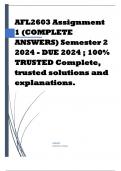AFL2603 Assignment
1 (COMPLETE
ANSWERS) Semester 2
2024 - DUE 2024 ; 100%
TRUSTED Complete,
trusted solutions and
explanations.
ADMIN
[COMPANY NAME]
,AFL2603 Assignment 1 (COMPLETE ANSWERS) Semester
2 2024 - DUE 2024 ; 100% TRUSTED Complete, trusted
solutions and explanations.
1.1 How did people in the olden days’ prior formal education,
transfer knowledge and skills to their children? Support your
answers with relevant examples. (15) 1.2 Folksongs and praise
poems are always regarded as old fashioned and outdated. Do
you agree or disagree with this statement? Support your answers
with relevant examples. (10) /25/
1.1 How did people in the olden days, prior to formal
education, transfer knowledge and skills to their children?
Support your answers with relevant examples. (15)
Transfer of Knowledge and Skills:
In the days before formal education systems were established,
people relied on various traditional methods to transfer
knowledge and skills to their children. These methods were
deeply rooted in cultural practices and community life. Here are
some key ways knowledge and skills were transferred:
1. Oral Tradition:
o Storytelling: Elders and community leaders shared
knowledge and cultural values through storytelling.
Stories often contained lessons about history, morals,
and social norms. For example, in many African
cultures, folktales were used to teach children about
, their heritage, the importance of community, and
ethical behavior.
o Proverbs and Sayings: Proverbs served as a means to
impart wisdom in a concise and memorable way. They
often conveyed societal values and practical life
lessons. For instance, the Zulu proverb "Umuntu
ngumuntu ngabantu" (A person is a person through
other people) emphasizes the importance of
community and mutual support.
2. Apprenticeship:
o Skill Acquisition: Children learned practical skills by
working alongside adults in their daily activities. For
example, in traditional societies, boys might learn
hunting and fishing skills from their fathers, while
girls might be taught weaving and cooking by their
mothers. This hands-on learning allowed children to
acquire valuable skills through observation and
practice.
o Craftsmanship and Trades: Artisans and craftsmen
trained younger generations in specific trades. In
ancient Egypt, for instance, young people learned the
art of pottery, metalworking, or weaving from
experienced artisans, often within family workshops.
3. Rites of Passage:
o Ceremonial Education: Many cultures had rites of
passage that marked the transition from childhood to
adulthood. These ceremonies often included training
and instruction on societal roles and responsibilities.
For example, in some indigenous cultures of North
America, vision quests or initiation ceremonies




